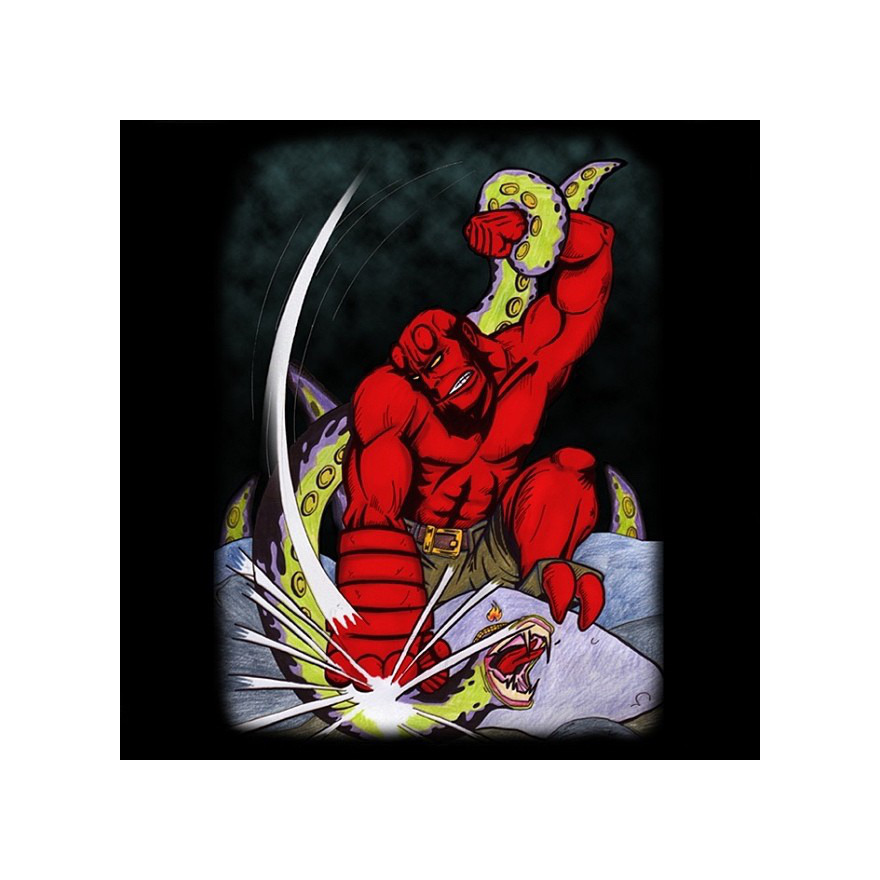A fan drawing of the “Hellboy” comic series for the Oz Comic Con drawing challenge. Courtesy of Simon Breese
By Salvador Castillo
When people hear the phrase “comic books,” one of two things happens. They’ll either groan and roll their eyes, classing comics as reading material for children, or they’ll get flustered and say they want to get into comics but are put off by the amount of issues and continuity they see as necessary.
However, I’ve decided to prove two points here: that comics are a legitimate form of literature, and that there are plenty of comic books that aren’t for children and don’t make you read hundreds of issues for the sake of “continuity.”
First, comics have evolved over the years since their first inception. It’s much more extensive than Marvel and DC. We now have Image Comics and Dark Horse Comics. Marvel and DC’s libraries have also expanded.
In recent years, graphic novels, similar to regular novels but told through the comic book medium, have become popular
A reliable example of this is Alan Moore’s timeless classic “Watchmen.” It shook the very foundations of the medium, pushed the boundaries of what could be portrayed in comics and was one of the first comic books to land on the New York Times bestseller list.
Let’s not forget that some high-profile writers have worked on graphic novels and comic books, such as Neil Gaiman, the writer of “American Gods,” “Coraline” and “The Graveyard Book,” who wrote the popular DC series “The Sandman.”
Stephen King also worked on “American Vampire” for the better part of its first major arc. And then there’s the comic writers who are held in high regard even among the circles of regular writers, like Brian K. Vaughan, known for “Ex Machina,” “Saga,” “Paper Girls” and “Y: The Last Man”; Garth Ennis, known for his “Punisher MAX” series, “The Boys” and “Preacher,” which was adapted into a TV show by AMC.
Perhaps the most recognizable figure, Robert Kirkman, who created the source material for “The Walking Dead” and “Outcast,” has also developed plenty of other titles like “Invincible” and “Oblivion Song.”
All of these people are incredibly good writers, with catalogs of work that are easy to keep up with.
Secondly, the idea that comic books are for kids is ridiculous. Just like any form of media, the creator’s intentions determine whether the material is PG or R rated.
So for the sake of perspective, I’m going to start listing and describing a few examples of comics with some mature subject matter.
First off, Alan Moore. His body of work is extensive, but the series he’s most closely associated with is “Watchmen.” The series focuses on a world where superheroes are commonplace, yet have been outlawed for a few years, and then someone starts killing them off.
Then after Moore, there’s Garth Ennis, who is often associated with either “The Boys” or “Preacher.” “The Boys” shows a world of superheroes in a more realistic way, where most let fame get to their heads and commit terrible atrocities, fully displayed and colored in this one, which makes it necessary to create a special super-powered police unit known as “The Boys.”
After that, I’d suggest picking up and reading “Powers” by Brian Michael Bendis, which is something similar to Ennis’ “The Boys,” yet it takes on a whole different set of themes.
There are also modern classics like “Chew” by John Layman, or one of DC’s Vertigo imprint great series “DMZ.”
The point is, most of these comics tackle some pretty mature topics, ranging from the reality and brutality of superheroes being commonplace to those that are more subtle, such as how far humans would go to survive when put in the right set of circumstances.
Each and every one of the titles I mentioned here is crafted with the same nuanced characters, tense narratives and emotional connections you can find in any other conventional novel.
In comics, when your favorite character goes through a moment of intense pain or despair, you get to see it in full display, panel by panel. So in a way, comics are more of an emotional slog than a regular book, where you have to visualize every detail in your mind.
The best way to prove my point is to get you to read graphic novels and comics. And if you’re worried about the cost of going out and buying comics, don’t be. The ones that I mentioned here are all available online, to read at the pace you want.
And if you’re like me and prefer the feel of a physical copy of a book, you can find plenty of volumes of comics at local libraries. “Hellboy” volumes are available in USF St. Petersburg’s library, and there are volumes of “Preacher” available across multiple libraries.
However, if you want to support creators in their efforts, then you should do a quick Google search for your nearest comics store. You may find something that suits your tastes, if not at first, eventually. It’s all about asking the right kind of questions.




I turn to a vampire any time i want to. i become a vampire because of how people treat me, this world is a wicked world and not fair to any body. at the snack of my finger things are made happened. am now a powerful man and no one step on me without an apology goes free. i turn to human being also at any time i want to. and am one of the most dreaded man in my country. i become a vampire through the help of my friend who introduce me into a vampire kingdom by given me their email. if you want to become a powerful vampire kindly contact mr marcus baur on this email for futher inquires:marcusbaur0101@gmail.com